new posts in all blogs
Viewing: Blog Posts Tagged with: turbo, Most Recent at Top [Help]
Results 1 - 14 of 14
How to use this Page
You are viewing the most recent posts tagged with the words: turbo in the JacketFlap blog reader. What is a tag? Think of a tag as a keyword or category label. Tags can both help you find posts on JacketFlap.com as well as provide an easy way for you to "remember" and classify posts for later recall. Try adding a tag yourself by clicking "Add a tag" below a post's header. Scroll down through the list of Recent Posts in the left column and click on a post title that sounds interesting. You can view all posts from a specific blog by clicking the Blog name in the right column, or you can click a 'More Posts from this Blog' link in any individual post.
Housekeeping: The Beat was down a bit over the weekend when my web host moved it to a faster, more up to date server. I also got one of those new fangled Time Warner modems that offers five times faster internet speed. So we’re TURBO here!
At the same time, the mouse I’ve been using for about five years went belly up. The coffee spill that happened a few weeks ago may have contributed but the autopsy results aren’t in yet. I immediately went to Staples and bought a $10 mouse as a stopgap, and upon getting it home it did not work. PERIOD. MELONFARMER. NEVER BUY CHEAP TECH. However, luckily later in the day I was walking by a pile of discarded computer equipment and was able to obtain a Mighty Mouse from the pile.

I haven’t used the Mighty Mouse in a while but upon touching it, I was reminded that Puny Mouse would have been a better name, as this is the worst designed mouse I have ever used. Basically right click happens at the most random times, it feels weird and I hate it. Not as much as I hate Staples, but it’s close.
It’s also a reminder that Apple products are rarely extensively tested in the human world after some engineer/designer says “It looks great!” and this is a huge flaw of the company. Despite the fast that I’m ApplefLife, i can see how this might contribute to the Apple-phobia some people have. Since all the new iPhones were announced, it seems the iWatch hasn’t been setting the world on fire, and I’m wondering it this Dick Tracy dream device fell into the same design trap.
But we’re persevering, and carrying on, crap mouse or no.
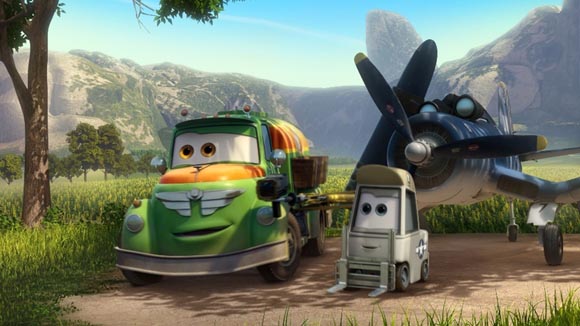
No new animated films opened last weekend, but there was plenty of animation in the theaters. Here are the estimated earnings of animated films in US theaters:
5th: Planes / $13.1 mil WEEKEND / $45.1 mil TOTAL
9th: Smurfs 2 / $4.6 mil WEEKEND / $57 mil TOTAL
12th: Despicable Me 2 / $3.8 mil WEEKEND / $346 mil TOTAL
16th: Turbo / $1 mil WEEKEND / $77.6 mil TOTAL
Internationally, the box office played out like this:
Smurfs 2 / $20 mil WEEKEND
Despicable Me 2 / $19.5 mil WEEKEND
Planes / $7.3 mil WEEKEND
Monsters University / $6 mil WEEKEND
Turbo / $2.9 mil WEEKEND
And the overall box office totals to date (US plus international):
Despicable Me 2: $781.2 mil
Monsters University: $658.6 mil
Smurfs 2: $207 mil
Turbo: $142 mil
Planes: $52.4 mil
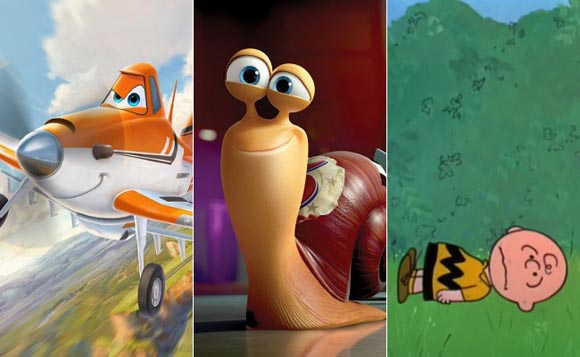
Luke Epplin writes convincingly in The Atlantic about the supremacy of the ‘magic-feather syndrome’ in kids’ animated features, which is the idea stemming from Dumbo that a character can do anything as long as they build up their self-esteem. The concept stretches back further, too. For example, The Little Engine That Could. Recent film like Planes and Turbo are both guilty of this phenomenon, according to Epplin:
Following one’s dreams necessarily entails the pursuit of the extraordinary in these films. The protagonists sneer at the mundane, repetitive work performed by their unimaginative peers. Dusty abhors the smell of fertilizer and whines to his flying coach that he’s “been flying day after day over these same fields for years.” Similarly, Turbo performs his duties in the garden poorly, and his insubordination eventually gets him and Chet fired. Their attitudes are all part of an ethos that privileges self-fulfillment over the communal good.
In addition to disparaging routine labor, these films discount the hard work that enables individuals to reach the top of their professions. Turbo and Dusty don’t need to hone their craft for years in minor-league circuits like their racing peers presumably did. It’s enough for them simply to show up with no experience at the world’s most competitive races, dig deep within themselves, and out-believe their opponents. They are, in many ways, the perfect role models for a generation weaned on instant gratification.
This predictable approach to storytelling is juxtaposed against the infinite riches of Charles Schulz’s comic Peanuts, and more specifically, the animated Peanuts feature A Boy Named Charlie Brown, in which Charlie Brown is denied instant gratification at every turn:
A Boy Named Charlie Brown might come across now as harsh and unforgiving–especially to audiences that aren’t familiar with the comic strip’s cruel undercurrents–but its lessons are more enduring than those from movies where characters fulfill their impossible dreams. Charlie Brown learns through Linus’s tough-love speech that failure, no matter how painful, is not permanent, and that the best means of withstanding it is simply to show up the next day to school with the fortitude to try again. Losing also forces Charlie Brown to come to terms with his own limitations. He can’t rely on a miraculous victory to rescue him from his tormented childhood. He followed his dream, it didn’t pan out, and he ends up more or less where he started, only a little more experienced and presumably with a little more respect from his peers. They may no longer be able to refer to him as “failure-face,” but Lucy still yanks away the football when he becomes too hopeful. It’s incremental, rather than life-altering, progress.
Epplin isn’t naive and knows that today’s market-tested, consumer-friendly animated features won’t take the kind of narrative risks that Schulz did in the 1960s. His suggestions for improvement are, nonetheless, quite sensible: “Contemporary animated films would never emulate the tough life lessons of A Boy Named Charlie Brown, but they’d do well to reintroduce the twin notions of failure and humility.”
The entire article is well worth a read, even if the release date of Dumbo is off by a couple years. And with a CGI Peanuts feature currently in the works, one hopes that the writers of the screenplay will stay true to the spirit of Schulz’s universe instead of following the cheap virtueless storytelling tropes of contemporary animation studio features.

Disney’s Planes opened in the United States in third place with an estimated $22.5 million this weekend. The debut of the DisneyToon Studios film topped the opening weekends of DreamWorks’ Turbo ($21.3 mil) and Sony’s Smurfs 2 ($17.5 mil). Planes cost $50 mil to produce, which is modest compared to the recent DreamWorks and Sony pics which cost $135-145 mil to produce. The film is a sad reminder to other studios: Disney can skimp on production quality and still do better than its competitors because of the strength of its all important Disney brand.
Smurfs 2 dropped 46% in its second outing with an estimated $9.5 mil. The film has grossed a paltry $46.6 mil in America. Despicable Me 2 held steady in its sixth weekend, with a ninth place finish of $5.7 mil and a massive total of $338.3 mil, which makes it the fifth highest-grossing American animated feature of all-time. Turbo crashed out of the top ten, landing in 12th place with $2.3 mil in its fourth weekend. The film suffered a huge 64% week-to-week drop and has made $75 mil to date.
International numbers coming soon…
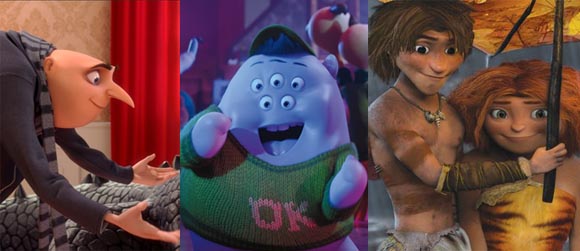
The Wall Street Journal published a story last weekend about Hollywood’s struggle to recoup its costs on big-budget tentpole films, but there’s one bright spot the WSJ (along with the rest of the mainstream media) always fail to recognize and that’s that animation is more successful than ever before.
Despite Turbo’ stumble at the box office and Henry Selick’s diss that American animated films are all the same, audiences around the world can’t get enough of big-budget CG animated features. Check this out:
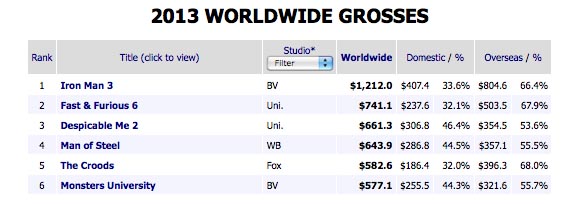
Only six films have grossed $500 million dollars or more at the worldwide box office in 2013, and three of those films are animated. Let’s put this into perspective: animation studios have released just five animated features this year with a production cost of over $75 million and three of those films became half-billion grossers; on the other hand, live-action filmmakers have released over 20 films this year that cost $75 million or more, and only three of those films have achieved a similar mark. The evidence is clear: expensive animated tentpoles have a much better chance of being profitable than their live-action counterparts.
Leading the way amongst animated films at last week’s box office was the mega-hit Despicable Me which landed in 3rd place with $16.4 mil in its fourth U.S. weekend, boosting its domestic total to $306.8 mil. The film added $24.5 mil from foreign markets for an overseas total of $354.5 mil.
Monsters University continued a similarly strong run, earning $2.9 mil in its sixth U.S. weekend and $15.6 mil from overseas. The film’s totals are now $255.5 mil domestically and $321.6 foreign. The film has yet to open in markets like China and Italy, and by the time it’s all over, the film should become Pixar’s fourth highest-grossing movie ever.
The only animated clunker in theaters right now is DreamWorks’ Turbo, which had a sophomore frame gross of $13.7 mil, good enough for fourth place and a U.S. total of $56.2 mil. The film had a slim 35.5% decline, but it was slim only because the film couldn’t decline much further from its already meager opening weekend. Turbo managed to pick up $12.5 mil from 30 overseas markets pushing its foreign total to $41.9 mil. After two weekends, the film’s combined gross is $98.1 mil.
More animation is coming soon, too. Sony’s Smurfs 2 will be released this week, and Disney’s Planes next week.

Following the lackluster opening of Turbo, DreamWorks Animation heard grumbling from Wall Street this afternoon, with shares in the company losing over 5% of their value on NASDAQ. Sterne Agee analyst Vasily Karasyo released a report this morning that offers a big-picture perspective on DreamWorks and explains why the weak Turbo debut highlights the erosion of DreamWorks’ business model, which relies largely on a few tentpole films every year.
Of course, DreamWorks management is well aware, too, that their reliance on blockbusters is not a sustainable long-term model, which is why Jeffrey Katzenberg is scrambling to diversify into other areas, such as acquiring Classic Media’s library, entering the Chinese animation and amusement park markets, and working with Netflix to create online series.
Here is Karasyo’s report:
DREAMWORKS ANIMATION SKG INC. (NASDAQ: DWA)
RATING: UNDERPERFORM
Price: $24.90
Price Target: $21.50
Weak Turbo Opening Highlights Business Model Erosion
Our Call
We believe that the weak opening of Turbo is not a one time event but another illustration of the challenges to DreamWorks Animation’s business model due to decreasing box office opportunity and high legacy production and releasing costs. Although the management’s efforts to build new revenue streams received a lot of attention recently, they are not enough to offset decreasing film profitability. We reiterate our Underperform rating.
- We estimate at this point that Turbo will generate $70 mln at the domestic box office, less than half of our and the Street’s pre-release estimate of $160 mln. A significant number of international territories don’t open till October but assuming IBO is in line with our forecast at $280 mln, we expect a $19 mln write-down which would drive $0.28 downside to our FY13 forecast. We don’t believe the company has to make a determination on the title’s profitability and therefore the write-down won’t happen until Q4.
If we are right about Turbo’s ultimate profitability, the risk to FY14 estimates is now significantly higher. There are two original releases, Peabody and Sherman and Happy Smekday, next year. With two out of the last three titles underperforming, we see the likelihood of another write-down as materially higher.
New revenue streams from the recent Netflix (NFLX – $264.58 – Neutral, Bhatia) deal only modestly decrease dependence on film earnings: we estimate they will account for $0.07 in EPS in FY14 assuming there are no execution issues. By comparison, Rise of The Guardians write-down impact on EPS was $0.68 and The Croods contribution to FY13 will be $0.26.
We think the execution risk associated with the Netflix deal is overlooked. In recent history, the company pursued several initiatives to drive incremental revenue which ran into challenges and did not yield expected results, e.g. Penguins of Madagascar consumer product licensing program and a shift to three films a year. The main challenge of the Netflix deal, in our view, is to produce high volume of content within tight time frame and at the target margin.

By: Jerry Beck,
on 7/21/2013
Blog:
Cartoon Brew
(
Login to Add to MyJacketFlap)
JacketFlap tags:
Pixar,
dreamworks,
Turbo,
DreamWorks Animation,
Illumination,
Illumination Entertainment,
Monsters University,
Despicable Me 2,
Box Office Report,
Add a tag
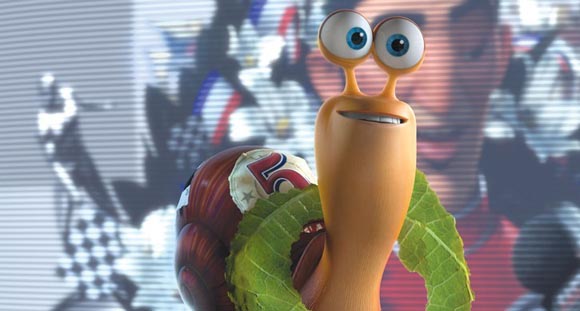
Turbo, the DreamWorks-produced and David Soren-directed animated feature about the snail that could, opened in a disappointing third place in the U.S. with an esimated $21.5 million. The film is the third-lowest all-time opening weekend for a DreamWorks CGI film, doing better than only Antz (1998) and the Aardman-produced Flushed Away (2006). However, adjusted for inflation and 3D prices, Turbo had the smallest opening weekend audience EVER for a DreamWorks CG pic. The film has grossed $31.2 million since opening last Wednesday.
Illumination’s Despicable Me 2 kept up its amazing run in its third weekend. The film landed in second place with an estimated $25.1 million. Its current domestic total is a smashing $276 million, and by next weekend it will pass Man of Steel to become the second-highest grossing film in America this year. Holding up the tenth place spot was Pixar’s Monsters University, which earned an estimated $5 million in its fifth weekend. The film’s total now stands at a robust $249 million.
International numbers to come in a bit.
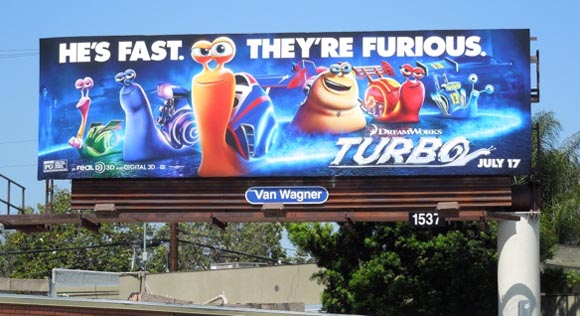
Few industry observers are banking on Turbo, the David Soren-directed DreamWorks pic about a garden snail who races in the Indianapolis 500, to be a blockbuster. But the film is being well received by its kindertot target demo, having received an A+ CinemaScore rating from filmgoers under age 18. The general audience has deemed it sufficiently likable too, giving it an A rating. The critical consensus has delivered a milder yet still respectable 67%.
In Variety critic Peter Debruge’s review, he forgoes the most obvious comparison to Pixar’s Cars and instead says it’s “closer in spirit to Pixar’s Ratatouille.” He continues, “Turbo adheres to an otherwise safe formula, combining cute cartoon characters with the standard all-American ‘dream big’ message: If a rat can thrive in a French restaurant, then why can’t a snail become an Indy speedster.” The NY Times sees the glass as half-full: “Even in the absence of originality, there is fun to be had,” while the Hollywood Reporter is less than impressed: “…[I]t’s as if the makers of Turbo had been pressed to come up with the most extreme underdog tale they could think of. Or else animators really are running out of ideas for original new characters.”
It’s your turn now. After you see the film, report back here with your thoughts in the comments below. As always, this talkback is reserved for readers who have seen the film and wish to comment on it. Any general comments about the film will be politely discarded.
(Turbo billboard via Daily Billboard)
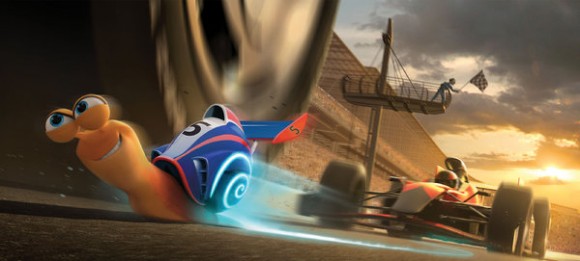 In the continuing evolution of the on-demand streaming deal between Netflix and DreamWorks Animation, it was reported earlier this week that DreamWorks will produce more than 300 hours of original programming for the popular streaming media outlet.
In the continuing evolution of the on-demand streaming deal between Netflix and DreamWorks Animation, it was reported earlier this week that DreamWorks will produce more than 300 hours of original programming for the popular streaming media outlet.
The new content, which will be inspired by characters from existing DreamWorks franchises like Shrek, Kung Fu Panda and Madagascar, as well as properties from the recently acquired Classic Media library (Casper the Friendly Ghost, Lassie, Rocky and Bullwinkle, among others) will begin to air in 2014.
The agreement is part of DreamWorks’ initiative to expand their entertainment brand by courting television production away from mainstream TV outlets like Cartoon Network and Nick, where its TV shows currently air. This will begin with the December Netflix debut of a new original series, Turbo F.A.S.T., based on the upcoming feature film Turbo, which will hit theaters on July 17. It will also offer Netflix exclusive streaming rights to a selection of DreamWorks animated films, including The Croods and their movie version of Mr. Peabody and Sherman, coming to theaters in March 2014.
For Netflix, the contract, which is the most significant first-run content deal in its history, is part of their ongoing efforts to beef up their selection of children’s programming, which is very popular among parents as it offers a commercial-free alternative for younger, more impressionable viewers. The streaming site did not renew a deal with Viacom for reruns of Nickelodeon cartoons, and will rely heavily on DreamWorks for kids’ content.

Jason Scheier is a visual development and concept artist at DreamWorks Animation SKG. Jason creates digital paintings as well as designs concepts in 3D.
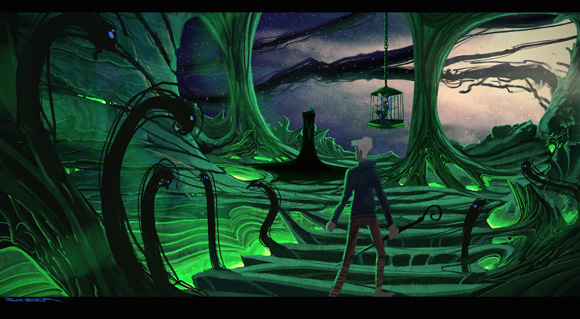
In 2008 Jason drew the above concept presentation pieces for The Guardians of Childhood project at DreamWorks that eventually became Rise of the Guardians.
The following digital paint studies were created as personal projects and class demonstrations:

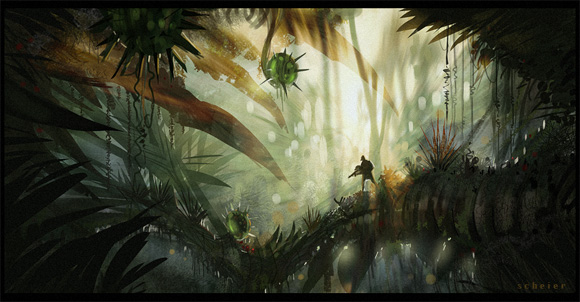



This is Jason’s modified Chevy Camaro design for the upcoming DreamWorks pic Turbo. The car was built and displayed at the Chicago Auto Show. See more of Jason’s work on his blog.

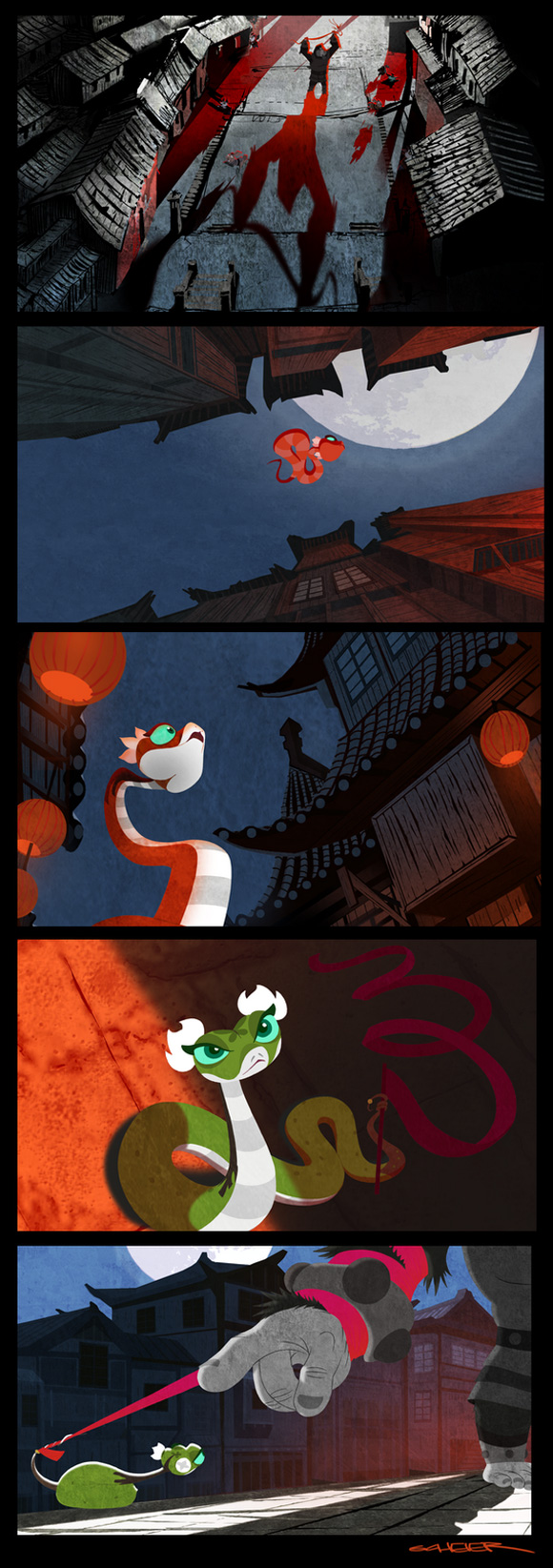
Yesterday, DreamWorks released the full trailer for its summer feature Turbo directed by David Soren. If I had to cite a few positive qualities, I’d point out the simple appeal of the character designs, as well as the exaggerated range of motion and funny mouth shapes on the snail characters.
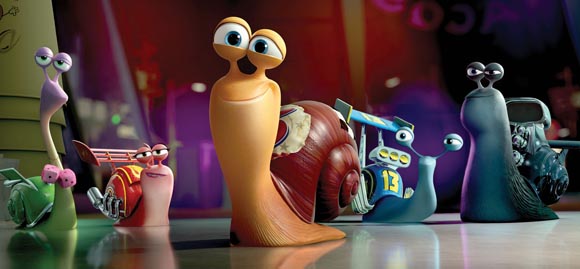
The world of TV animation is changing drastically, mainly by the fact that new animated shows aren’t even appearing on TV. Netflix has announced a deal with DreamWorks Animation in which they will produce an original animated series based on the upcoming feature Turbo and stream the show on-demand.
The DreamWorks/Netflix deal doesn’t appear to be a one-off experiment The NY Times reports that Amazon’s competing Prime Instant Video is developing five children’s shows of its own.
DreamWorks head Jeffrey Katzenberg, whose company still produces TV shows like Kung Fu Panda: Legends of Awesomeness and How to Train Your Dragon for traditional cable outlets, was careful to couch the announcement in a way that didn’t outright state the demise of TV, by claiming that the deal is “part of the television revolution.”
In reality, though, the Netflix deal is a paradigm shift that upends the entire television model. When Netflix debuted its live-action series House of Cards earlier this month, they offered all of the first season’s thirteen-episdes at once. There is a chance that something similar will happen with the Turbo series.
A good analysis of what Netflix is doing can be found in this New Yorker piece, “Why Netflix’s The House of Cards Could Signal The Decline of Cable Television.
And more about the new Turbo series from the official release:
LOS ANGELES — Netflix and DreamWorks Animation will create the first ever Netflix Original Series for kids. Based on the highly-anticipated DreamWorks Animation movie Turbo, premiering in theaters this summer, the Netflix series Turbo: F.A.S.T. (Fast Action Stunt Team) debuts exclusively this December in the United States and across the globe in the 40 countries where Netflix offers its service.
“Families love Netflix, so creating an original series for kids was a natural for us. And we’re doing it in a big way by adapting Turbo, this year’s DreamWorks Animation summer tentpole movie,” said Ted Sarandos, Chief Content Officer of Netflix. “DreamWorks Animation has a long track record of creating incredibly successful characters and stories that delight people of all ages. We’re thrilled to add Turbo the series as well as all new DreamWorks Animation films, starting with their 2013 slate, to Netflix.”
“Netflix boasts one of the largest and fastest-growing audiences in kids television. They pioneered a new model for TV dramas with House of Cards, and now together, we’re doing the same thing with kids’ programming,” said DreamWorks Animation’s Chief Executive Officer, Jeffrey Katzenberg. “DreamWorks is thrilled to be part of the television revolution.”
Turbo’s pursuit of racing greatness continues in Turbo: F.A.S.T.: an episodic animated television series that picks up where the feature film leaves off. It showcases the world-traveling exploits of our snail hero and his tricked-out racing crew as they master outrageous new stunts and challenge any villain unlucky enough to cross their path.
In addition to the original TV series Turbo: F.A.S.T., new DreamWorks Animation feature titles will be made available for Netflix members in the U.S. to watch beginning with the studio’s 2013 film line-up

By: Jerry Beck,
on 9/9/2012
Blog:
Cartoon Brew
(
Login to Add to MyJacketFlap)
JacketFlap tags:
B.O.O: Bureau of Otherwordly Operations,
Happy Smekday!,
How to Train Your Dragon 3,
Kung Fu Panda 3,
Me and My Shadow,
Mumbai Musical,
The Penguins of Madagascar,
CGI,
Feature Film,
Trolls,
dreamworks,
How to Train Your Dragon,
Turbo,
DreamWorks Animation,
The Croods,
Mr. Peabody and Sherman,
20th Century-Fox,
Add a tag

DreamWorks Animation has unveiled the most ambitious animated feature slate of any cartoon studio in history. Beginning next spring, DreamWorks will release a total of 12 features in 3-1/2 years under their new distribution deal with Fox.
More details about DreamWorks’ plans can be found at the Wall Street Journal and The Hollywood Reporter. Here is the list of films and release dates:
The Croods (March 22, 2013)
Turbo (July 19, 2013)
Mr. Peabody & Sherman (Nov. 1, 2013)
Me and My Shadow (March 14, 2014)
How to Train Your Dragon 2 (June 20, 2014)
Happy Smekday! (Nov. 26, 2014)
The Penguins of Madagascar (March 27, 2015)
Trolls (working title, June 5, 2015)
B.O.O: Bureau of Otherwordly Operations (Nov. 6, 2015)
Mumbai Musical (working title, Dec. 19, 2015)
Kung Fu Panda 3 (March 18, 2016)
How to Train Your Dragon 3 (June 18, 2016)
Our friends at ComingSoon.net snapped some intriguing images from the floor of The Licensing Expo, the industry trade show that started today in Las Vegas. Here’s another look at Chris Sanders highly anticipated The Croods; Dreamworks’ racing snail film, Turbo; and Chris Wedge’s Epic (formerly known as The Leaf Men), based on William Joyce’s book. Which one are you most excited about?
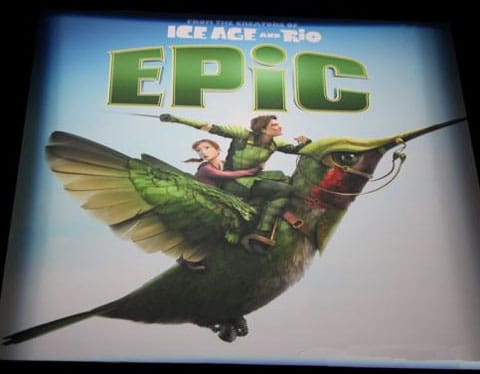
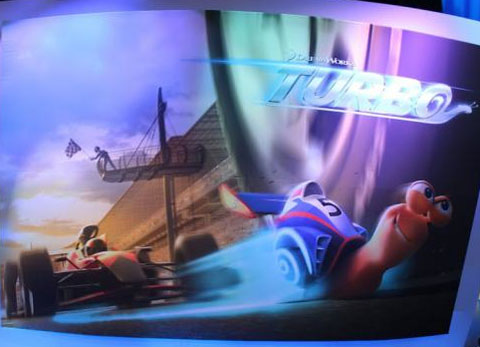
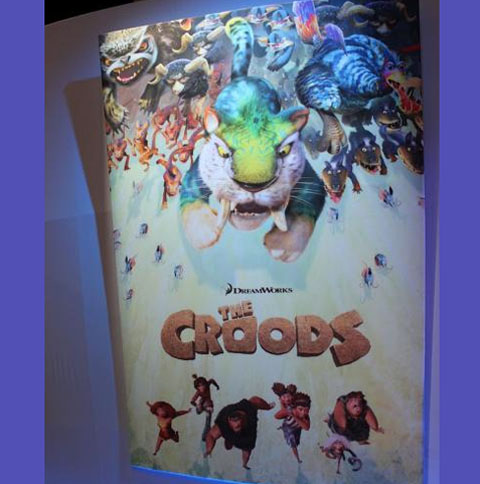
Cartoon Brew |
Permalink |
No comment |
Post tags: Epic, The Croods, Turbo












 In the
In the 













A Logitech Performance MX mouse will solve your problems. Fits your hand, works great, comfortable as all heck.
Just the other day my grandma was telling me she was looking to replace her Mighty Mouse.
It’s definitely a triumph of style over substance. Who thought it was better to keep the “all one button” design and graft a right click on using a touch sensor than just to have a second damn mouse button?
Well, I’ve got an idea who, and he’s the same guy who held off on putting hard drives in Macs for most of the 1980’s because they were too loud.
The new Magic Mouse works great though.
No, the absolute worst mouse ever made were the ones that Apple made around the time of their “Graphite” stage. They were perfectly round, which was completely the opposite of ergonomic.
I use Macs, but always end up replacing the mouse. Keyboard too — the “chiclet” keyboards don’t do it for me either.
I’m using one of those mighty mice right now, and it’s more like the @^#$@#* mouse: the scroll/track ball on top has never worked properly. Maybe mouse hair is caught in it…
Go buy a Logitech wireless and be done with it.
I use an Apple trackpad instead of a mouse. Changed my life. Not even joking.
Thad: the first personal computer to use a hard drive, ten megabytes in size, was a Macintosh computer first on sale in September 1985. The drive itself was first manufactured earlier that year, so Jobs hardly held off on using one. Apple as a general rule adopts new technology quicker than most similar companies, sometimes to their embarrassment as wiry he Newton.
Why doesn’t someone merge a cellphone with a mouse?
Replace the camera with the optical sensor.
Transmit special menus to the touch screen (like for Photoshop!)
Side buttons for clicking, top of the screen is reserved for scrolling.